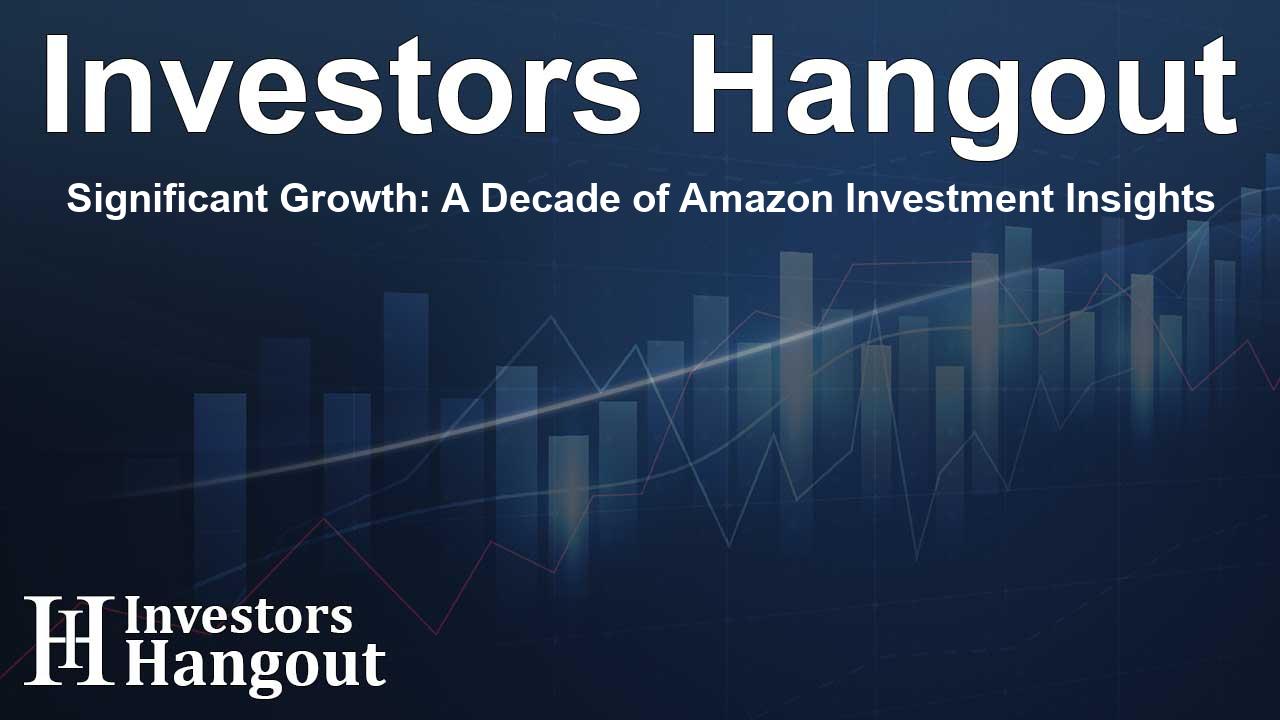Significant Growth: A Decade of Amazon Investment Insights

An In-Depth Look at Amazon's Growth Over a Decade
Over the last ten years, Amazon.com (NASDAQ: AMZN) has demonstrated remarkable growth that has captivated investors and analysts alike. With an annualized return of 27.65%, Amazon has outperformed the broader market by 16.65%. Today, it boasts an impressive market capitalization of $1.95 trillion, reaffirming its status as a leading player in the e-commerce and technology sectors.
Your $100 Investment in Amazon: What It’s Worth Today
To put things into perspective, consider the impact of investing $100 in Amazon.com stock a decade ago. If an investor had made that leap, their investment would now be valued at approximately $1,145.14, given the current trading price of $185.79. This growth encapsulates the power of strategic investing backed by a solid business model.
The Mechanics of Compounding Returns
The substantial increase in the value of an investment can largely be attributed to the concept of compound returns. Essentially, this means that gains are reinvested to generate additional earnings over time. This multiplier effect is a cornerstone of successful investing and explains why long-term strategies often yield significant rewards.
Understanding the Factors Behind Amazon's Success
Several factors contribute to Amazon's impressive performance over the years. The company has continually innovated and expanded its services, venturing beyond e-commerce into areas like cloud computing with Amazon Web Services (AWS), digital streaming, and even groceries through its acquisition of Whole Foods. Each of these segments not only boosts revenue but also further diversifies the company's offerings, enhancing its overall market position.
What This Means for Future Investors
For potential investors, the story of Amazon underscores the importance of patience and long-term thinking in the investment landscape. Compounding returns can work wonders over time, encouraging new and seasoned investors to consider how today's decisions may shape their financial future. As more people recognize the benefits of investing in quality companies like Amazon, it becomes evident that foundational knowledge and strategies are essential for building wealth.
Frequently Asked Questions
How much would a $100 investment in Amazon be worth today?
A $100 investment in Amazon ten years ago would be worth approximately $1,145.14 today.
What is the annualized return of Amazon over the past decade?
Amazon has achieved an impressive annualized return of 27.65% over the past ten years.
What factors have contributed to Amazon's success?
Amazon's success is attributed to continuous innovation, expansion into new markets, and diversification of its services.
Why is compounding return important for investors?
Compounding returns allow investors to earn interest on their initial investment, as well as on the returns from previous periods, significantly increasing wealth over time.
What should new investors learn from Amazon's growth?
New investors can learn the value of long-term investment strategies and the impact of compound growth when choosing quality companies to invest in.
About Investors Hangout
Investors Hangout is a leading online stock forum for financial discussion and learning, offering a wide range of free tools and resources. It draws in traders of all levels, who exchange market knowledge, investigate trading tactics, and keep an eye on industry developments in real time. Featuring financial articles, stock message boards, quotes, charts, company profiles, and live news updates. Through cooperative learning and a wealth of informational resources, it helps users from novices creating their first portfolios to experts honing their techniques. Join Investors Hangout today: https://investorshangout.com/
Disclaimer: The content of this article is solely for general informational purposes only; it does not represent legal, financial, or investment advice. Investors Hangout does not offer financial advice; the author is not a licensed financial advisor. Consult a qualified advisor before making any financial or investment decisions based on this article. The author's interpretation of publicly available data shapes the opinions presented here; as a result, they should not be taken as advice to purchase, sell, or hold any securities mentioned or any other investments. The author does not guarantee the accuracy, completeness, or timeliness of any material, providing it "as is." Information and market conditions may change; past performance is not indicative of future outcomes. If any of the material offered here is inaccurate, please contact us for corrections.